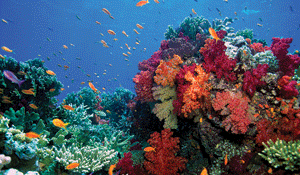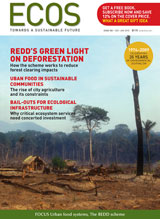
|
Published:
Coral reef services valued at US$172 billion
One hectare of coral reef provides humans with ecosystem services valued at US$130 000 to $1.2 million per year, according to economic research presented at the DIVERSITAS biodiversity conference in Cape Town in October.

|
|
The high value of services provided by coral reefs means that protection and restoration investment can offer a high rate of return. Credit: istockphoto
|
The figures are based on an analysis of more than 80 coral reef valuation studies, which costed the key services provided by coral reefs as follows:
-
food, raw materials and ornamental resources: $1000–$6000;
-
climate regulation, pollution treatment and biological control: $26 000–$35 000;
-
cultural services such as tourism: $88 700–$1 million; and
-
maintenance of genetic diversity: $13 500–$57 000.
‘Taken together, coral reef services worldwide have an average annual value estimated at $172 billion,’ says economist Pavan Sukhdev, of the United Nations Environment Programme’s The Economics of Ecosystems and Biodiversity project.
The economic analysis of coral reefs and other ecosystems, such as forests, grasslands, mangroves and rivers, aims to help societies make better informed choices. For example, if levels of atmospheric carbon dioxide exceed 350 ppm, scientists say coral reefs are unlikely to survive. But halving the clearing of tropical forests for timber and agriculture would slow the rise of CO2 and forestall anticipated climate change – at an estimated value of $3.7 trillion.
‘Investment in protected areas holds exceptional high returns,’ Mr Sukhdev says.
Investing money in coral reef restoration, for example, would provide a seven per cent rate of return, while restoration of tropical forests and grasslands would return 50 per cent and 79 per cent respectively.



